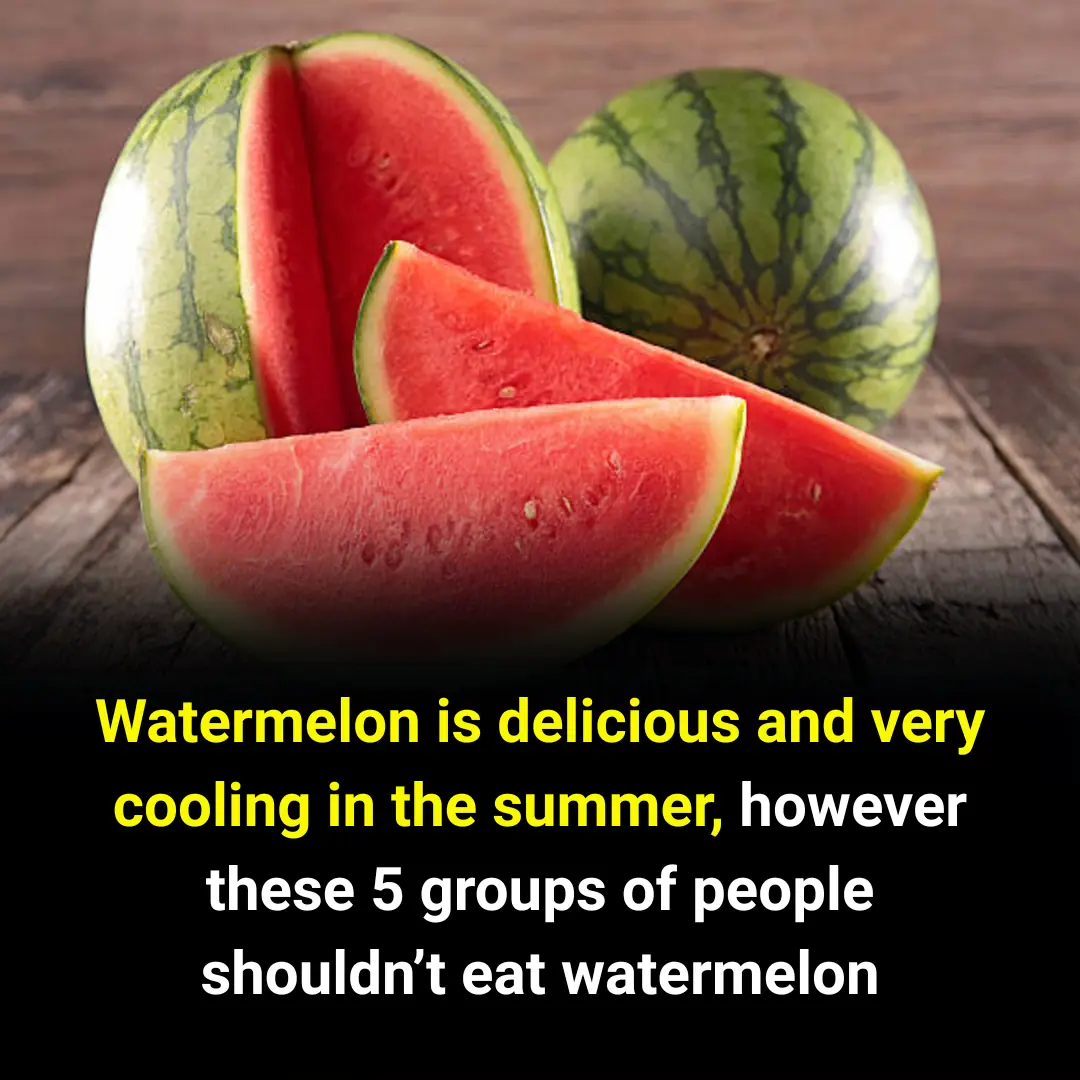Why Watermelon Is Not Ideal for Everyone — And If You Should Avoid It
Watermelon is the ultimate summer treat—hydrating, sweet, and full of nutrients. But despite its refreshing appeal, not everyone should indulge freely. New guides like the one on The Busted News warn that watermelon may be risky or ill-advised for certain populations. Let’s dive into the five key groups who might want to skip that juicy slice, based on science-backed sources like Medical News Today and Healthline, plus expert insights.
1. People with Digestive Disorders (IBS or Sensitive Stomachs)
What the risk is:
Watermelon is rich in FODMAPs, particularly fructose and sugar alcohols, which can ferment in the gut and cause bloating, gas, cramps, and diarrhea healthline.com.
In plain terms:
For those with IBS or sensitive digestion, even a single serving (1–2 cups) might lead to significant discomfort. Healthline explains that excessive consumption can trigger these symptoms healthline.com.
Reddit users agree:
“If you get diarrhea from it, it’s too much.”
“Watermelon has a lot of fructose…an entire watermelon will have much more than that.” pmc.ncbi.nlm.nih.gov+4reddit.com+4healthline.com+4
High FODMAP fruits like watermelon should be limited or avoided by these individuals.
2. People with Diabetes or Blood Sugar Management Concerns
Why it matters:
Despite being mostly water, watermelon ranks high on the glycemic index (GI 72–80). That means it can cause rapid increases in blood sugar healthline.com.
The caveat:
Portion control is key. Healthline notes that one cup isn’t dangerous — around 5–6 GL — but overindulging (e.g., 4 cups) could spike blood sugar due to 46 grams of carbs healthline.com.
Who should watch out:
- People with diabetes (especially Type 1)
- Individuals with insulin resistance
- Those on carbohydrate-controlled diets
Even healthy people might benefit from moderation to prevent glucose surges.
3. Individuals with Kidney Disease, Heart Failure, or Potassium Sensitivity
What’s the concern:
Watermelon is naturally high in potassium—a good thing for many, but potentially dangerous for those whose kidneys can’t filter potassium efficiently reddit.com+2medicalnewstoday.com+2healthline.com+2.
Why it matters:
Excess potassium may cause hyperkalemia, leading to irregular heartbeat, muscle weakness, and potentially life-threatening changes in normal cardiac function. People with kidney, adrenal, heart conditions or on potassium-sparing medications should be cautious .
4. Those Prone to Allergies – Especially to Melons
Potential reactions:
Watermelon allergies aren’t widespread, but they do occur. Symptoms may include itching, hives, swelling, or in severe cases, anaphylaxis .
If you’re affected:
Even mild oral allergy syndrome (itchy mouth/throat) means watermelon is off-limits. In severe cases, emergency treatment is necessary.
5. People with Swallowing Difficulties (Dysphagia)
Why it’s risky:
Watermelon is classified as a dual-consistency food—simultaneously liquid and solid. That makes it tricky and potentially dangerous for those with dysphagia, as they can choke or aspirate if the juicy and solid parts aren’t managed correctly medicalnewstoday.com+5oscarcaregroup.com.au+5reddit.com+5.
Professional advice:
Speech pathologists recommend avoiding watermelon unless the texture can be modified (like juiced and appropriately thickened) per IDDSI guidelines oscarcaregroup.com.au.
🧠 Why These Warnings Matter
Watermelon is celebrated for its vitamins A and C, antioxidants like lycopene, hydration power, and low-calorie punch pmc.ncbi.nlm.nih.gov+3medicalnewstoday.com+3healthline.com+3. But the very properties that make it refreshing also increase risk for certain individuals.
- 🍉 High fructose/FODMAP content → digestive upset
- 🍉 High GI → blood sugar spikes
- 🍉 High potassium → kidney and cardiac strain
- 🍉 Allergens → allergic reactions
- 🍉 Dual texture → choking hazard
✅ Who Should Enjoy Watermelon Freely
- Healthy individuals with no digestive, metabolic, or kidney issues
- People who can tolerate fruits well
- Those mindful of servings — 1–2 cups is safe for most
⚠️ Smart Tips for “At-Risk” Groups
| Condition | Recommendation |
|---|---|
| IBS/Sensitive stomach | Try ≤ 100 g watermelon; avoid triggers and track reaction |
| Diabetes | Pair with fiber or protein; stick to 1 cup servings max |
| Kidney/Heart conditions | Consult physician on potassium limits; opt for low-potassium fruits if needed |
| Allergy sufferers | Conduct cautious testing; consult allergist if symptoms emerge |
| Dysphagia | Skip or use pureed or thickened juice forms; follow IDDSI texture levels and expert guidance |
🍽 Smart Watermelon Alternatives
If watermelon doesn’t suit you, here are hydrating, nutritious swaps:
- Low-FODMAP fruit: strawberries, oranges, or grapes
- Lower-GI options: apples, pears, or berries
- Low-potassium: pineapple, berries, peaches
- Safer textures for dysphagia: yogurts, smoothies (properly thickened)
Real Talk from Reddit
Real user experiences underline the risks:
“If you get diarrhea from it, it’s too much.”
“Watermelon has a lot of fructose…an entire watermelon will have much more than that.” healthline.com+3reddit.com+3oscarcaregroup.com.au+3healthline.com
Final Word
Watermelon is healthy, tasty, and hydrating — but it’s not universally safe. These five groups should proceed with care or avoid it:
- Those with IBS or digestive issues
- Individuals with diabetes or blood sugar concerns
- Patients with kidney disease, heart failure, or potassium-sensitive conditions
- People with melon allergies
- Individuals with dysphagia
If you fall into any of these categories, consult your healthcare provider or a dietitian. For most people, enjoying watermelon in moderation is a summertime pleasure worth savoring—safely!

